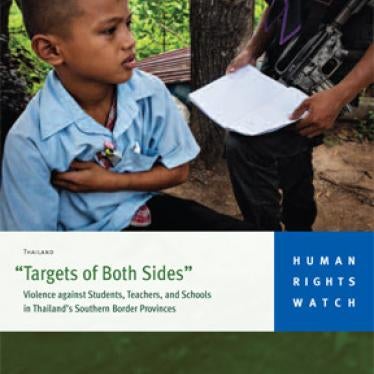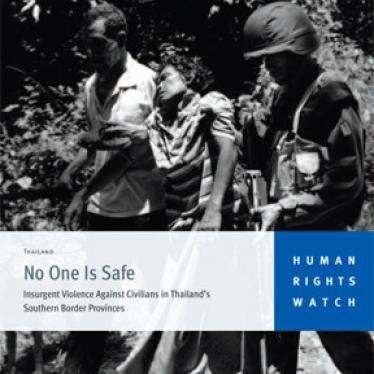(New York) – Armed separatist groups in Thailand’s southern border provinces have renewed attacks on teachers and schools in a campaign of terror that has heightened fear among the population, Human Rights Watch said today.
On October 1, 2012, separatist insurgents shot dead a teacher, Komsan Chomyong, from Ban Bor Ngor elementary school who was traveling through an insurgent-controlled area in Ra Ngae district, Narathiwat province. On September 24, alleged insurgents detonated a bomb at the entrance of Batu Mitrapap 66 School in Bacho district of Narathiwat, where a meeting of school directors was being held, wounding directors Kordir Laemaenae and Ma Durama. On August 9, alleged insurgents detonated a bomb inside Ban Gawa School in Narathiwat’s Su Ngai Padi district in an apparent attack on a school protection unit from the 4809th Border Patrol Police; no one was injured.
“The separatist insurgents in southern Thailand have renewed their attacks on teachers and government schools, which they view as symbols of the Thai Buddhist state,” said Brad Adams, Asia director. “But it is an attack on both basic decency and international law to kill and maim those educating children, and it threatens children’s safety and education.”
Human Rights Watch said that attacks on teachers in the provinces of Pattani, Yala, and Narathiwat have become a frequent occurrence since the outbreak of violence in January 2004 by separatist insurgents in the predominantly ethnic Malay Muslim region. The Pejuang Kemerdekaan Patani (Patani Independence Fighters) insurgents in the loose network of BRN-Coordinate (National Revolution Front-Coordinate) have ambushed teachers while traveling to and from their schools, and killed them in their classrooms and lodgings. Komsan Chomyong was the 152th teacher killed by separatist groups in the past eight years. Insurgents have reportedly torched more than 300 government-run schools during the same period.
Students have frequently been killed and wounded in insurgent attacks targeting security personnel assigned to provide safe passage to and from school, or protecting the school grounds. For example, two students from Romklao School were injured by shrapnel when their school bus was hit by an explosion in Narathiwat’s Yi Ngor district on September 27. Police believed that insurgents detonated the bomb as a military vehicle escorting the school bus passed by. On September 10, 8-year-old Muhammadsafik Lateh stepped on a landmine while walking through bushes off the road in Narathiwat’s Ra Ngae district. The explosion severed his left leg. A suspect who was arrested reportedly confessed that he planted the landmine and others against security units patrolling Tanyongmas-Dusongyor Road.
“Separatist groups use these attacks to demonstrate their power and discredit Thai authorities, but it is ordinary people and their children who are suffering,” Adams said. “These attacks on schools seem to be part of a larger campaign by insurgents to use violence and terror to drive Buddhist Thais out of the southern provinces and keep local Muslims under their control."
Escalating Attacks on Civilians
Insurgents have recently stepped up attacks on civilians, causing widespread fear in both the Thai Buddhist and Malay Muslim populations. At least 30 people, including a 7-year-old girl, were wounded when two 40 mm rounds were fired from a M79 grenade launcher into a local fair in Narathiwat’s Bacho district on September 29. On September 21, insurgents opened fire on a gold shop in the market of Pattani’s Sai Buri district and then detonated a car bomb when police and security forces arrived at the scene, killing six people and wounding at least 50 others, and damaging several shop-houses, cars, and motorcycles. The insurgents repeated their deadly tactic of using an initial attack to lure security forces, rescue officials, and onlookers to the scene before launching a secondary attack with motorcycle bombs or car bombs.
Some recent insurgent attacks appear designed primarily to spread terror among the population. For example, on August 29, insurgents in Yala’s Bannang Sata district shot and beheaded Tuanda-o Tuansulong while he drove to Muang district. According to a police investigation, Tuanda-o was driving alone in a pickup truck when a group of insurgents stopped his car. They shot him in the head, decapitated him, and threw his head on the roadside, before setting his body and the pickup on fire.
Thai army security operations have weakened the Pejuang Kemerdekaan Patani insurgents, but they maintain a presence in hundreds of ethnic Malay Muslim villages in the southern border provinces. During the course of the armed conflict since 2004, insurgents have killed more than 4,000 people, mostly civilians. Targeting civilians for attack violates international humanitarian law applicable in the region. Some insurgent cells have merged with underground cartels involved in drug trafficking, arms smuggling, and human trafficking across the Thai-Malaysian border, adding to the thriving criminality in the region.
The Pejuang Kemerdekaan Patani insurgents assert that they are fighting to liberate their homeland from the occupation of Buddhist Thais. They continue to use landmines as “area-denial” weapons against Buddhist Thais who own rubber and fruit plantations, as well as the Malay Muslims working in those places.
On September 6 in Narathiwat’s Ra Ngae district, Jiraporn Ratanawong stepped on a landmine while working in her rubber plantation, which severed her left foot. Rubber plantation worker Maena Latae had her left leg blown off by a landmine in Narathiwat’s Muang district on September 1. Thailand’s insurgent groups are prohibited under international humanitarian law from carrying out attacks, such as with antipersonnel landmines, that cannot discriminate between combatants and civilians.Additionally, Thailand is a party to the 1997 Mine Ban Treaty, which comprehensively bans the use, production, stockpiling, and transfer of antipersonnel mines.
Daily violence and a climate of fear have seriously disrupted the lives of ordinary people. Many Thai Buddhists and Malay Muslims are now closing businesses and stopping work every week on Friday, the Muslim day of prayer, after insurgent groups issued an order to do so in September.
Both separatist insurgents and the Thai security forces have violated international humanitarian law, the laws of war, in the southern border provinces. Insurgents have claimed that the civilians attacked were part of the Thai Buddhist state that is a party to the armed conflict, but the laws of war allow no such justification for attacks on civilians. Radical interpretations of Islamic law that would permit attacks on civilians in certain circumstances are also contrary to the laws of war. International humanitarian law explicitly prohibits reprisal attacks against civilians and captured combatants, summary execution of civilians or captured combatants, mutilation or other mistreatment of the dead, and attacks directed at civilian facilities, which are frequent tactics of insurgents.
Thai security forces and pro-government militias have been implicated in torture, enforced disappearances, and extrajudicial killings against suspected insurgents or alleged supporters among the Malay Muslim community. Prime Minister Yingluck Shinawatra on September 5 announced that special attention would be given to improving the situation in the southern border provinces. However, on September 11, the government extended for three months the existing state of emergency in the south, the 30th extension since 2005 of a draconian law that has facilitated security force abuses. Human Rights Watch reiterated its call for credible and impartial investigations into alleged violations of international humanitarian and human rights law in the region.
“Prime Minister Yingluck needs to ensure that Thai security forces protect public safety with full respect for human rights and due process of law,” Adams said. “Shielding abusive security personnel from prosecution will only intensify the cycle of reprisals and violence.”







